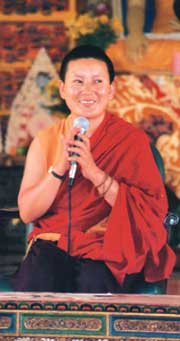 Known around Kathmandu as the singing nun, the high-tech nun, and the driving nun, Ani Choyin Drolma is perhaps best described as "the progressive nun." She's progressive not only in her embrace of modern technology (she drives a car, rides rollercoasters and uses a cellular phone), but in her magnanimous goal of fostering a better educated, more socially engaged community of nuns.
Known around Kathmandu as the singing nun, the high-tech nun, and the driving nun, Ani Choyin Drolma is perhaps best described as "the progressive nun." She's progressive not only in her embrace of modern technology (she drives a car, rides rollercoasters and uses a cellular phone), but in her magnanimous goal of fostering a better educated, more socially engaged community of nuns. Though the status of nuns, like that of women in general, has improved since the women were ordained in India around the time of Sakyamuni Buddha, even today nuns have far fewer opportunities to study than monks.
Generally, they are expected to engage in prayers and pujas within the nunnery, while monks occupy themselves with more rigorous intellectual pursuits, such as Buddhist philosophy and debate. The more subtle and difficult aspects of Buddhist philosophy, which most monks are obliged to master, are rarely taught in nunneries in Nepal. "Our society's patriarchal mindset is very strong. Most people don't encourage women to be active and educated. As a result, monasteries get more financial support than nunneries, so they get better facilities. It's not that nuns are stupid or that they can't study, it's just that the financial support isn't there," explains Ani Choyin.
In an effort to remedy the glaring discrepancy between monks' and nuns' education, in 1998 Ani Choyin established the Nuns' Welfare Foundation, which aims at improving the education and status of nuns. Three years ago, she started the foundation's first major project, the Arya Tara School for nuns. "There are so many academic institutions for monks that it's difficult to even count them. It's hard to think of just one similar institution for nuns," Ani Choyin said.
As a young nun at Nagi Gumba, Ani Choyin didn't have the opportunity to engage in academic study, but she managed to learn English and basic medical skills through private instruction, which she claims improved her confidence enormously. Now, she hopes to help other nuns achieve the same degree of self-assurance. "In just a few years, I've seen the difference an education makes for these girls," Ani Choyin said. And indeed, the young nuns at the Arya Tara School are bright, confident, and outgoing.
 Ani Choyin calls her institution a school rather than a nunnery because she's more of an educator than a spiritual director. Nuns from any nunnery in Nepal can come to the Arya Tara School to engage in serious study for a maximum of eight years and then return to their nunneries, where they will be equipped to teach and provide basic medical services. This year, 14 nuns between the ages of nine and twenty are studying English, Tibetan, math, biology, basic first aid, and Buddhist philosophy- a range of subjects impossible to find in a traditional nunnery. But however unconventional Ani Choyin's school may seem, her program of study has essential Buddhist practices and teachings at its core. When they leave the Arya Tara School, Ani Choyin's students will be better prepared to practice the axial Buddhist principles of compassion and skilful means by serving their communities as teachers, nurses, and spiritual counsellors. Ani Choyin hopes that in addition to providing practical assistance, these accomplished nuns will encourage more people to educate girls.
Ani Choyin calls her institution a school rather than a nunnery because she's more of an educator than a spiritual director. Nuns from any nunnery in Nepal can come to the Arya Tara School to engage in serious study for a maximum of eight years and then return to their nunneries, where they will be equipped to teach and provide basic medical services. This year, 14 nuns between the ages of nine and twenty are studying English, Tibetan, math, biology, basic first aid, and Buddhist philosophy- a range of subjects impossible to find in a traditional nunnery. But however unconventional Ani Choyin's school may seem, her program of study has essential Buddhist practices and teachings at its core. When they leave the Arya Tara School, Ani Choyin's students will be better prepared to practice the axial Buddhist principles of compassion and skilful means by serving their communities as teachers, nurses, and spiritual counsellors. Ani Choyin hopes that in addition to providing practical assistance, these accomplished nuns will encourage more people to educate girls. With 14 students to provide for and plans to build a school large enough for 100 nuns at Pharping, it's no wonder that Ani Choyin is constantly working to raise funds. Lucky for her and for any young nun who wants to study, that Ani Choyin is tenacious and gregarious-and an extremely talented singer. Since 1998, Ani Choyin has been performing traditional Buddhist chants in the United States, Canada, Europe, and Nepal to raise money for her foundation. Though she's been a gifted singer since her childhood, Ani Choyin attributes her musical success to her teacher, Tulku Urgen Rinpoche, who encouraged her singing and taught her the beautiful spiritual songs that she now performs around the world. The chants originate from a practice called Chod, or "cutting," because engaging in the practice helps to cut through egotistic tendencies. "Singing or listening to these songs gives rise to a mental state where there is no negativity, no clinging, no duality," says Ani Choyin. People who've heard her sing are quickly convinced of the salubrious effects of her music. Her voice has a natural clarity and organic quality that perfectly conveys the spontaneous and ecstatic nature of the songs.
With four albums out, including a more innovative collection of dance music that layers traditional chanting and modern, trip-hop beats, Ani Choyin has affected countless people through her music and become something of a celebrity-no doubt a first for a Buddhist nun. In the midst of it all, however, Ani Choyin remains focused, humble, and dedicated to the memory of Tulku Urgyen Rinpoche.
Although her initial US and European tours were enormously successful, Ani Choyin had reservations about performing in Kathmandu at first. "I wasn't sure how the local people would react," she says. "This is something completely new for a Buddhist nun to be doing. People want to see a nun who is secluded and quietly saying mantras, not performing and socialising." Like any groundbreaking performer, Ani Choyin has had caustic criticism as well as fervent praise. Conservatives within the Buddhist community consider her conduct unseemly for a nun and disapprove of her reformist educational agenda. "People very ignorantly cling to their own narrow idea of what it is to be Buddhist. I may not follow all the conventions of being a Buddhist nun, but my belief and vision are very clear."
Irrepressibly optimistic, Ani Choyin continues to defy her critics and raise money for her foundation by singing. On 7 April, she will perform in their third annual fundraising concert at the Patan Museum, and after that, she'll be touring the US and Europe for two months. Though performing for such a long stretch is incredibly demanding, Ani Choyin never gets tired of singing. "Singing is the best job in the world," she smiles. "It makes others happy, it makes me happy." And it might help pave the way for young nuns to practice what they believe.


